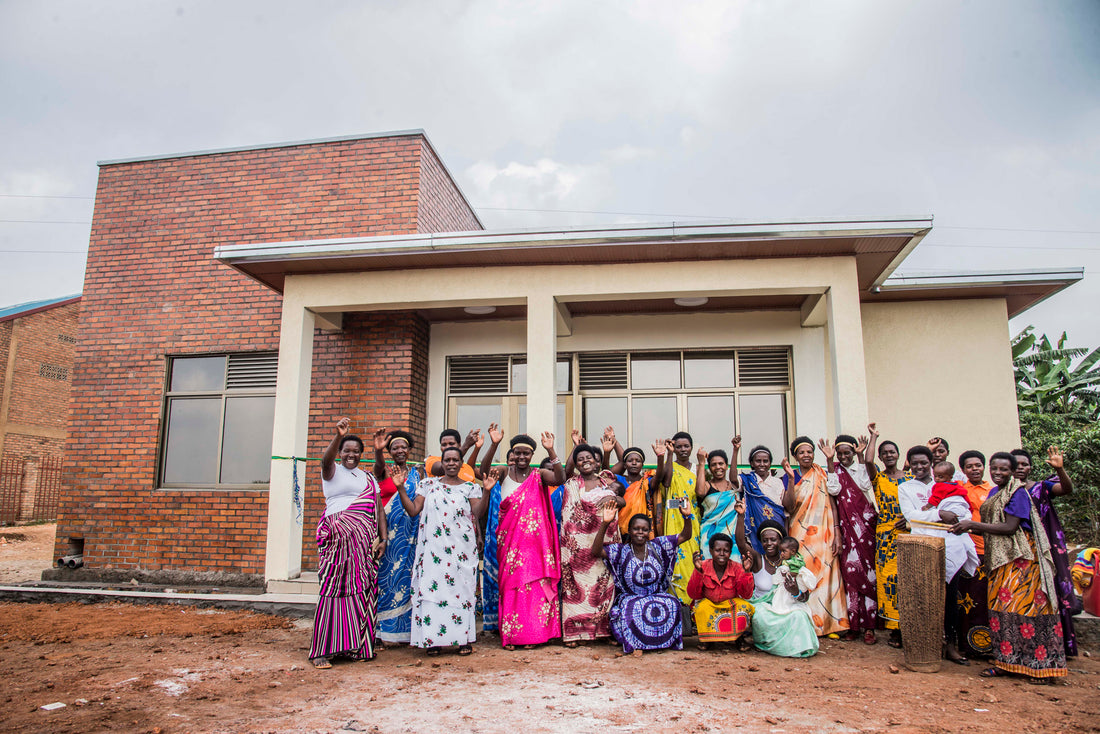==split_content==
 ==split_content==
==split_content==
Blood Orange, Honey Sweetness, Black Tea

This special microlot was produced by women farmers who own and grow coffee on small farms in the hills surrounding Mbilima washing station, located in the Coko Sector of Gakenke District, in Rwanda’s rugged and mountainous Northern Province. The women are members of the Dukunde Kawa Cooperative, who own and manage Mbilima along with two other nearby washing stations.
In 2019, with the help of the Australian coffee community, our green beans supplier, Melbourne Coffee Merchants funded the construction of a craft and community building for the Rambagira Kawa women’s cooperative (pictured above) to weave baskets and other products – an important source of revenue during coffee’s off-season.

Many of the women who contributed to this lot are also members of Rambagirakawa, a women’s alliance within Dukunde Kawa that was formed to advocate for support and resources for female coffee producers. Through collaboration with both Rambagirakawa and international buyers, Dukunde Kawa has assisted the women in processing and marketing their coffees as a separated ‘Women’s Coffee’ lot, which earns them an additional bonus payment on top of the quality premium all Dukunde Kawa members receive.
Many of the founding members of Rambagirakawa were widowed by the 1994 genocide and relied upon each other for farming and financial advice. The group is now open to all of the female members of Dukunde Kawa and has grown to 304 members, of whom 55 contributed to this lot.
Besides selling their coffees as separated lots, its members have wholeheartedly pursued additional income opportunities, like basket weaving and embroidery, to develop greater independence both economically and socially. The result is an empowered and ambitious alliance of women, whose ever-expanding activities focus on creating opportunity and success for the women and children in their community.

About Mbilima Washing Station
Mbilima sits at a staggeringly high 2,020 metres above sea level, making it one of Rwanda’s highest washing stations. By Rwandan standards, it is quite a small washing station, servicing a total of 874 growers (643 men, 231 women) in the area. It was built in 2005 with the profits earned from Dukunde Kawa’s first washing station, Ruli. Four permanent staff and 49 seasonal workers are employed by Mbilima – of whom 95% are women.
Day-to-day operations at Mbilima are overseen by Jean Bosco Habimana, who has been the washing station’s manager since 2014. The washing station is 100% organic, Rainforest Alliance certified, UTZ certified, and Fair Trade certified. Jean Bosco explained that becoming certified was extremely useful in formalising and documenting a lot of things that the cooperative was already doing. “It helped us to better the lives of our producers and quality of our coffee. It’ was a lot of work to get the certifications,” he explained, “but it also made us realise how many positive things we were already doing. The certifications reinforce this.” Because all lots processed at Mbilima are organic, they are dry milled and kept separately.

Processing At Mbilima Washing Station
The team at Dukunde Kawa takes a huge amount of care in processing its coffee. All members of the Dukunde Kawa Cooperative are trained to only select ripe coffee cherries from their trees.
On delivery the cherries are inspected and sorted by hand to ensure only the very ripest cherries are processed. They are then sorted by weight (and any floaters are removed) by a Pinhalense machine that the washing station staff affectionately have nicknamed the ‘Umupolisi’ (police officer). They are then pulped on the same day – usually in the evening – using a mechanical pulper that divides the beans into three grades by weight, with the heaviest, A1, usually having the highest cup quality.
After pulping, the coffee is fermented overnight for around 12–18 hours and then graded again using floatation channels that sort the coffee by weight. The beans are then soaked for a further 24 hours, before being moved to raised screens for ‘wet sorting’ by hand.

As at most washing stations in Rwanda, women do the majority of hand-sorting. This takes place in two stages – on the covered pre-drying tables and on the drying tables. Washed beans are moved from the wet fermentation tanks onto the pre-drying tables, where they are intensively sorted under shade for around six hours. The idea is that greens (unripe beans) are still visible when the beans are damp, while the roofs over the tables protect the beans from the direct sunlight.
Next, the beans are moved onto the washing station’s extensive raised drying tables (‘African beds’) for around two weeks, where they are sorted again for defects, turned regularly and protected from rain and the midday sun by covers, ensuring both even drying and the removal of any damaged or defective beans. During this period the coffee is also turned several times a day by hand to ensure the coffee dries evenly and consistently.
After reaching 11% humidity, the coffee is then transported to Dukunde Kawa’s purpose-built warehouse prior to final dry-milling and hand sorting at the cooperative’s dry mill.

Why We Love It
Coffees from this area are sweet and complex, with exceptional character. We love supporting the women of Mbilima washing station by featuring their coffee as a separate lot. This year’s lot has great intensity and complexity.
We feel so lucky to work with Dukunde Kawa. When we first started working with the cooperative over a decade ago, the president at the time, Anastase Minani, explained that their goal was to be the very best cooperative in Rwanda. We think they’re well on their way to achieving this goal, and we are excited to have been able to share this journey with them.
